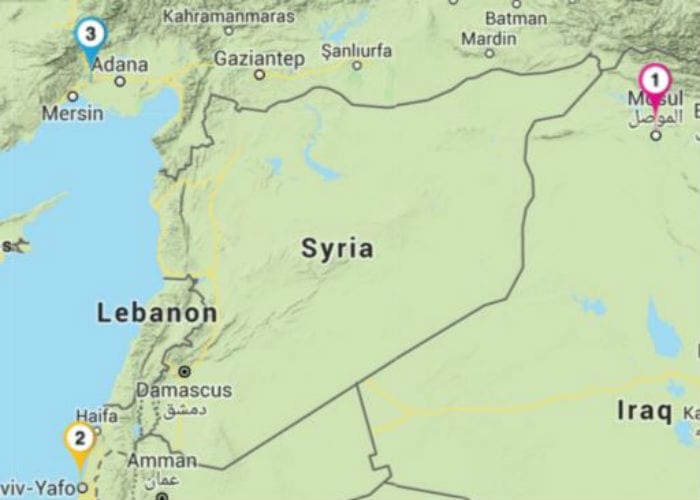
TORAH
NEVI'IM
KETUVIM
Chapter 3 | The Israel Bible - Jonah - Chapter 3
Translation and Transliteration of Chapter 3 | The Israel Bible - Jonah - Chapter 3
Listen to this chapter in Hebrew:
Audio Player- Commentary
- Buy E-book
- Buy the Israel Bible
1The word of Hashem came to Yona a second time:
אוַיְהִי דְבַר־יְהֹוָה אֶל־יוֹנָה שֵׁנִית לֵאמֹר׃
2“Go at once to Nineveh, that great city, and proclaim to it what I tell you.”
בקוּם לֵךְ אֶל־נִינְוֵה הָעִיר הַגְּדוֹלָה וִּקְרָא אֵלֶיהָ אֶת־הַקְּרִיאָה אֲשֶׁר אָנֹכִי דֹּבֵר אֵלֶיךָ׃
3Yona went at once to Nineveh in accordance with Hashem's command. Nineveh was an enormously large city a three days' walk across.
גוַיָּקָם יוֹנָה וַיֵּלֶךְ אֶל־נִינְוֶה כִּדְבַר יְהֹוָה וְנִינְוֵה הָיְתָה עִיר־גְּדוֹלָה לֵאלֹהִים מַהֲלַךְ שְׁלֹשֶׁת יָמִים׃
4Yona started out and made his way into the city the distance of one day's walk, and proclaimed: “Forty days more, and Nineveh shall be overthrown!”
דוַיָּחֶל יוֹנָה לָבוֹא בָעִיר מַהֲלַךְ יוֹם אֶחָד וַיִּקְרָא וַיֹּאמַר עוֹד אַרְבָּעִים יוֹם וְנִינְוֵה נֶהְפָּכֶת׃
5The people of Nineveh believed Hashem. They proclaimed a fast, and great and small alike put on sackcloth.
הוַיַּאֲמִינוּ אַנְשֵׁי נִינְוֵה בֵּאלֹהִים וַיִּקְרְאוּ־צוֹם וַיִּלְבְּשׁוּ שַׂקִּים מִגְּדוֹלָם וְעַד־קְטַנָּם׃
6When the news reached the king of Nineveh, he rose from his throne, took off his robe, put on sackcloth, and sat in ashes.
ווַיִּגַּע הַדָּבָר אֶל־מֶלֶך נִינְוֵה וַיָּקָם מִכִּסְאוֹ וַיַּעֲבֵר אַדַּרְתּוֹ מֵעָלָיו וַיְכַס שַׂק וַיֵּשֶׁב עַל־הָאֵפֶר׃
7And he had the word cried through Nineveh: “By decree of the king and his nobles: No man or beast—of flock or herd—shall taste anything! They shall not graze, and they shall not drink water!
זוַיַּזְעֵק וַיֹּאמֶר בְּנִינְוֵה מִטַּעַם הַמֶּלֶךְ וּגְדֹלָיו לֵאמֹר הָאָדָם וְהַבְּהֵמָה הַבָּקָר וְהַצֹּאן אַל־יִטְעֲמוּ מְאוּמָה אַל־יִרְעוּ וּמַיִם אַל־יִשְׁתּוּ׃
8They shall be covered with sackcloth—man and beast—and shall cry mightily to Hashem. Let everyone turn back from his evil ways and from the injustice of which he is guilty.
חוְיִתְכַּסּוּ שַׂקִּים הָאָדָם וְהַבְּהֵמָה וְיִקְרְאוּ אֶל־אֱלֹהִים בְּחָזְקָה וְיָשֻׁבוּ אִישׁ מִדַּרְכּוֹ הָרָעָה וּמִן־הֶחָמָס אֲשֶׁר בְּכַפֵּיהֶם׃
9Who knows but that Hashem may turn and relent? He may turn back from His wrath, so that we do not perish.”
טמִי־יוֹדֵעַ יָשׁוּב וְנִחַם הָאֱלֹהִים וְשָׁב מֵחֲרוֹן אַפּוֹ וְלֹא נֹאבֵד׃
10Hashem saw what they did, how they were turning back from their evil ways. And Hashem renounced the punishment He had planned to bring upon them, and did not carry it out.
va-YAR ha-e-lo-HEEM et ma-a-say-HEM kee SHA-vu mi-dar-KAM ha-ra-AH va-yi-NA-khem ha-e-lo-HEEM al ha-ra-AH a-sher di-BER la-a-sot la-HEM v'-LO a-SAH
יוַיַּרְא הָאֱלֹהִים אֶת־מַעֲשֵׂיהֶם כִּי־שָׁבוּ מִדַּרְכָּם הָרָעָה וַיִּנָּחֶם הָאֱלֹהִים עַל־הָרָעָה אֲשֶׁר־דִּבֶּר לַעֲשׂוֹת־לָהֶם וְלֹא עָשָׂה׃
![]() 3:10 How they were turning back from their evil ways
3:10 How they were turning back from their evil ways
The people of Nineveh don sackcloth, fast, and sit in dust and ashes, in the hope that this will bring Hashem to forgive them. What Yona teaches us, however, is that it is not these external actions that bring about their forgiveness. Instead, what impresses Hashem is the fact that these actions reflected, and perhaps helped bring about, a fundamental change in their mentality. They abandon their evil ways and make a true commitment to behave righteously and justly in the future. Without such a genuine change of heart, the external signs remain empty gestures. The Sages of the Talmud (Taanit 16a) derive this lesson from the fact that the verse does not say “God saw their sackcloth and fasting,” but rather, “Hashem saw what they did, how they were turning back from their evil ways”.







